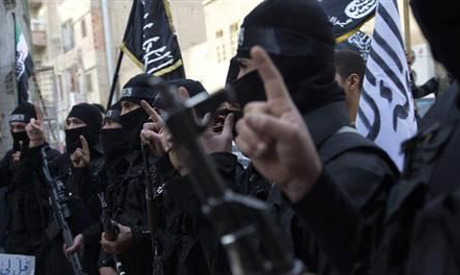
Members of an Islamist group hold their weapons during a protest against Syria's President Bashar al-Assad's regime in Deir el-Zor, 25 February, 2013. (Photo: Reuters)
A Sufi Muslim shrine was blown up in eastern Syria on Sunday, opposition activists said, blaming al Qaeda-affiliated militants who have joined in the increasingly sectarian civil war.
Militants placed explosives at the shrine of Sheikh Eissa Abdelqader al-Rifaiy in the rebel-held town of Busaira, 45 km (30 miles) east of the provincial capital of Deir al-Zor, and detonated them on Sunday morning, they said.
The activists contacted by Reuters said they suspected al Qaeda-linked fighters of the Islamic State in Iraq and the Levant (ISIL) were behind the explosion.
"The Islamic State has a base outside the town. The ease by which they got to the shrine indicates that their presence is growing," activist Abu al-Tayyeb al-Deiri said from Deir al-Zor.
Video footage and a photo released by the Britain-based Syrian Observatory for Human Rights monitoring group showed the shrine reduced to a field of shattered rock and twisted metal with trees and a small domed building in the background.
Several graves and other sites belonging to the Sufi sect, a mystical school of Islam opposed by puritanical Salafists from which al Qaeda draws its ranks, have been burnt or destroyed in the province in the past few months, opposition sources said.
The Observatory, which has a network of sources across Syria, said another shrine had been blown up in the same area last month.
Tension has been rising in Deir al-Zor between ISIL, composed largely of foreign fighters, and other rebel brigades drawn from eastern tribes, who turned against President Bashar al-Assad after a crackdown on protests in the revolt's early months.
The 2-1/2-year conflict has become increasingly sectarian as rebels overwhelmingly from Syria's Sunni Muslim majority fight to oust Assad, a member of the Shi'ite-derived Alawite sect.
Resentment of Alawite dominance of Syria's political and security establishment under 40 years of Assad family rule was a major factor in the start of the rebellion.
Regional Shiapower Iran has backed Assad in the conflict while Saudi Arabia and other majority Sunni Gulf states have supported the rebels.
Shiafighters from Lebanon and Iraq have entered the conflict on Assad's side while foreign Sunnis have come to fight for the rebels.
Assad has cast himself as a bulwark against al Qaeda, whose affiliate ISIL has launched successful attacks against his forces, but which has been increasingly involved in clashes with other rebel groups in northern and eastern Syria.
Short link: